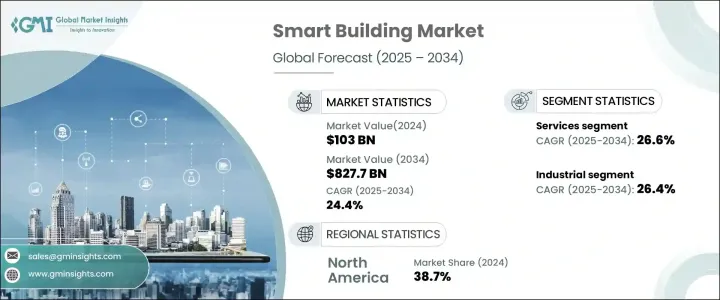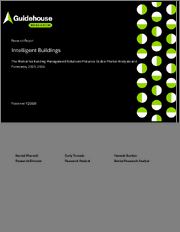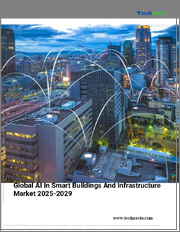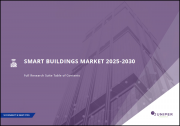
|
시장보고서
상품코드
1698570
스마트 빌딩 시장 - 기회, 성장 촉진요인, 산업 동향 분석, 예측(2025-2034년)Smart Building Market Opportunity, Growth Drivers, Industry Trend Analysis, and Forecast 2025-2034 |
||||||
세계의 스마트 빌딩 시장 규모는 2024년 1,030억 달러로, 2025년부터 2034년까지 연평균 복합 성장률(CAGR) 24.4%를 나타낼 것으로 예측됩니다.
이 산업의 확대에는 에너지 효율, 지속가능성, 생산성 향상에 대한 수요 증가가 기여하고 있습니다. 기업 및 주택 소유자는 비즈니스 최적화, 비용 절감 및 진화 규제 준수를 목적으로 스마트 기술에 대한 투자를 늘리고 있습니다.

에너지 효율화의 필요성은 스마트 빌딩 업계의 주요 추진력이 되고 있습니다. AI가 탑재된 HVAC 시스템은 거주 상황이나 기상 조건에 따라 공조 제어를 동적으로 조정하고 에너지 낭비를 최소화합니다. 규제 프레임워크가 강화됨에 따라 기업은 지속가능성의 목표에 따라 스마트 솔루션의 통합을 강요하고 있습니다.
| 시장 범위 | |
|---|---|
| 시작 연도 | 2024년 |
| 예측 연도 | 2025-2034년 |
| 시작 금액 | 1,030억 달러 |
| 예측 금액 | 8,277억 달러 |
| CAGR | 24.4% |
AI와 IoT는 실시간 데이터 분석과 예측 통찰력을 제공함으로써 스마트 빌딩의 미래를 재구성하고 있습니다. 스마트 시스템은 에너지 사용, 물 소비, 폐기물 생성을 관리하고 보다 지속 가능한 에코시스템을 구축합니다. AI를 활용한 예지보전의 통합은 다운타임을 줄이고 시스템 장애를 미연에 방지합니다.
기술 중심의 혁신은 빌딩 관리를 지속적으로 변화시켜 더 큰 제어, 보안, 편의성을 제공합니다. 예지보전은 잠재적인 문제에 미리 대처하는 것으로, 원활한 운영을 보증합니다.
경쟁력 유지를 목표로 하는 기업은 AI 주도의 에너지 관리 솔루션에 대한 투자를 우선하고 있습니다. 실시간 가동 상황, 기상 조건, 사용 동향에 따라 빌딩 운영을 최적화하는 능력은 매우 중요합니다.
시장은 솔루션과 서비스로 구분되며, 서비스 분야는 CAGR 26.6%로 성장할 것으로 예측됩니다. 예지보전서비스에 대한 수요 증가가 이 성장의 주요 요인입니다.
2024년에는 상업 부문이 시장의 51.7%를 차지하고 우위를 차지할 것으로 보입니다. 미국에서 2024년 시장 규모는 306억 달러로 기업과 주택 소유자가 에너지 사용을 최적화하고 이산화탄소 배출량을 줄이는 스마트 솔루션을 채택하는 경향이 강해지고 있습니다.
목차
제1장 조사 방법과 조사 범위
- 시장 범위와 정의
- 기본 추정과 계산
- 예측 계산
- 데이터 소스
제2장 주요 요약
제3장 업계 인사이트
- 생태계 분석
- 밸류체인에 영향을 주는 요인
- 이익률 분석
- 파괴
- 미래의 전망
- 제조업체
- 유통업체
- 공급자의 상황
- 이익률 분석
- 주요 뉴스
- 규제 상황
- 영향요인
- 성장 촉진요인
- 에너지 효율과 지속가능성의 중요성 증가
- 스마트 빌딩딩의 기술적 진보
- 비용 절감과 업무 효율화
- 정부의 규제와 인센티브
- 업계의 잠재적 위험 및 과제
- 높아지는 사이버 보안에 대한 우려
- 높은 초기 비용
- 성장 촉진요인
- 성장 가능성 분석
- Porter's Five Forces 분석
- PESTEL 분석
제4장 경쟁 구도
- 소개
- 기업 점유율 분석
- 경쟁 포지셔닝 매트릭스
- 전략 전망 매트릭스
제5장 시장 추계 및 예측 : 컴포넌트별, 2021-2034년
- 주요 동향
- 솔루션
- 안전 및 보안 관리
- 입퇴실 관리 시스템
- 비디오 감시 시스템
- 화재 및 생활 안전 시스템
- 에너지 관리
- HVAC 제어 시스템
- 조명 관리 시스템
- 기타
- 건물 인프라 관리
- 주차장 관리 시스템
- 물 관리 시스템
- 기타
- 통합 워크플레이스 매니지먼트 시스템(IWMS)
- 부동산 관리
- 자본 프로젝트 관리
- 시설 관리
- 오퍼레이션 및 서비스 관리
- 환경 및 에너지 관리
- 네트워크 관리
- 유선 기술
- 무선 기술
- 안전 및 보안 관리
- 서비스
제6장 시장 추계 및 예측 : 최종 용도별, 2021-2034년
- 주요 동향
- 주택
- 상업
- 헬스케어
- 소매
- 학교
- 기타
- 산업
제7장 시장 추계 및 예측 : 지역별, 2021-2034년
- 주요 동향
- 북미
- 미국
- 캐나다
- 유럽
- 영국
- 독일
- 프랑스
- 스웨덴
- 네덜란드
- 러시아
- 아시아태평양
- 중국
- 인도
- 일본
- 한국
- 호주
- 라틴아메리카
- 브라질
- 멕시코
- 중동 및 아프리카
- 남아프리카
- 사우디아라비아
- 아랍에미리트(UAE)
제8장 기업 프로파일
- ABB
- Azbil corporation
- Cisco
- Hitachi ltd
- Honeywell
- Huawei
- IBM
- Intel Corporation
- legrand
- Microsoft Corporation
- Schneider Electric SE
- Siemens AG
- Johnsons controls
- NEC Corporation
- Nexii Building Solutions Inc
The Global Smart Building Market was valued at USD 103 billion in 2024 and is expected to grow at a CAGR of 24.4% from 2025 to 2034. The expansion of this industry is fueled by the rising demand for energy efficiency, sustainability, and improved productivity. The rapid adoption of 5G, IoT, AI, and advanced data analytics is transforming the market landscape. Additionally, the transition toward building management systems as a service is further accelerating market growth. Businesses and residential property owners are increasingly investing in smart technologies to optimize operations, reduce costs, and comply with evolving regulations. Governments and regulatory bodies are also pushing energy efficiency initiatives, encouraging wider adoption of intelligent building solutions.

The need for energy efficiency has become a major driver of the smart building industry. As energy consumption reduction gains importance, IoT, automation, and energy management software play a crucial role in optimizing energy usage. AI-powered HVAC systems dynamically adjust climate control based on occupancy and weather conditions, minimizing energy waste. Stricter regulatory frameworks are compelling businesses to integrate smart solutions that align with sustainability goals. Advanced monitoring systems track energy consumption patterns, helping property owners make informed decisions that enhance operational efficiency.
| Market Scope | |
|---|---|
| Start Year | 2024 |
| Forecast Year | 2025-2034 |
| Start Value | $103 Billion |
| Forecast Value | $827.7 Billion |
| CAGR | 24.4% |
AI and IoT are reshaping the future of smart buildings by enabling real-time data analysis and predictive insights. IoT facilitates continuous monitoring, while AI identifies inefficiencies and recommends solutions. Smart systems manage energy use, water consumption, and waste production, creating a more sustainable ecosystem. The integration of AI-powered predictive maintenance reduces downtime, preventing system failures before they occur. Cloud-based platforms further enhance efficiency by enabling seamless automation of critical building functions.
Technology-driven innovations continue to transform building management, providing greater control, security, and convenience. AI, IoT, and cloud computing have significantly improved real-time monitoring and automation, allowing administrators to make data-driven decisions. Predictive maintenance ensures smooth operations by proactively addressing potential issues. With these advancements, smart buildings are becoming increasingly efficient, cost-effective, and environmentally friendly.
Companies aiming to stay competitive are prioritizing investments in AI-driven energy management solutions. The ability to optimize building operations based on real-time occupancy, weather conditions, and usage trends is crucial. Adopting green building certifications has also become a key strategy for attracting environmentally conscious clients and complying with sustainability regulations.
The market is segmented into solutions and services, with the services segment projected to grow at a CAGR of 26.6%. The increasing demand for predictive maintenance services is a key factor behind this growth. The solutions segment, valued at USD 63.3 billion in 2023, includes energy management, safety and security management, integrated workplace systems, and network management. Smart infrastructure solutions such as HVAC control, lighting management, and water conservation systems are gaining traction.
The commercial segment is set to dominate, accounting for 51.7% of the market in 2024. North America leads with a 38.7% share, driven by the growing emphasis on energy efficiency. In the United States, the market was valued at USD 30.6 billion in 2024, with businesses and homeowners increasingly adopting smart solutions to optimize energy use and reduce carbon footprints.
Table of Contents
Chapter 1 Methodology & Scope
- 1.1 Market scope & definitions
- 1.2 Base estimates & calculations
- 1.3 Forecast calculations
- 1.4 Data sources
- 1.4.1 Primary
- 1.4.2 Secondary
- 1.4.2.1 Paid sources
- 1.4.2.2 Public sources
Chapter 2 Executive Summary
- 2.1 Industry synopsis, 2021-2034
Chapter 3 Industry Insights
- 3.1 Industry ecosystem analysis
- 3.1.1 Factor affecting the value chain
- 3.1.2 Profit margin analysis
- 3.1.3 Disruptions
- 3.1.4 Future outlook
- 3.1.5 Manufacturers
- 3.1.6 Distributors
- 3.2 Supplier landscape
- 3.3 Profit margin analysis
- 3.4 Key news & initiatives
- 3.5 Regulatory landscape
- 3.6 Impact forces
- 3.6.1 Growth drivers
- 3.6.1.1 Growing importance of energy efficiency and sustainability
- 3.6.1.2 Technological advancement in smart buildings
- 3.6.1.3 Cost savings and operational efficiency
- 3.6.1.4 Government regulations and incentives
- 3.6.2 Industry pitfalls & challenges
- 3.6.2.1 Rising cybersecurity concern
- 3.6.2.2 High initial cost
- 3.6.1 Growth drivers
- 3.7 Growth potential analysis
- 3.8 Porter's analysis
- 3.9 PESTEL analysis
Chapter 4 Competitive Landscape, 2024
- 4.1 Introduction
- 4.2 Company market share analysis
- 4.3 Competitive positioning matrix
- 4.4 Strategic outlook matrix
Chapter 5 Market Estimates & Forecast, By Component, 2021-2034 (USD Billion)
- 5.1 Key trends
- 5.2 Solution
- 5.2.1 Safety & security management
- 5.2.1.1 Access control system
- 5.2.1.2 Video surveillance system
- 5.2.1.3 Fire and life safety system
- 5.2.2 Energy Management
- 5.2.2.1 HVAC control system
- 5.2.2.2 Lighting management system
- 5.2.2.3 Others
- 5.2.3 Building infrastructure management
- 5.2.3.1 Parking management system
- 5.2.3.2 Water management system
- 5.2.3.3 Others
- 5.2.4 Integrated Workplace Management System (IWMS)
- 5.2.4.1 Real estate management
- 5.2.4.2 Capital project management
- 5.2.4.3 Facility management
- 5.2.4.4 Operations and services management
- 5.2.4.5 Environment and energy management
- 5.2.5 Network management
- 5.2.5.1 Wired technology
- 5.2.5.2 Wireless technology
- 5.2.1 Safety & security management
- 5.3 Service
Chapter 6 Market Estimates & Forecast, By End Use, 2021-2034 (USD Billion)
- 6.1 Key trends
- 6.2 Residential
- 6.3 Commercial
- 6.3.1 Healthcare
- 6.3.2 Retail
- 6.3.3 Academic
- 6.3.4 Others
- 6.4 Industrial
Chapter 7 Market Estimates & Forecast, By Region, 2021-2034 (USD Billion)
- 7.1 Key trends
- 7.2 North America
- 7.2.1 U.S.
- 7.2.2 Canada
- 7.3 Europe
- 7.3.1 UK
- 7.3.2 Germany
- 7.3.3 France
- 7.3.4 Sweden
- 7.3.5 Netherlands
- 7.3.6 Russia
- 7.4 Asia Pacific
- 7.4.1 China
- 7.4.2 India
- 7.4.3 Japan
- 7.4.4 South Korea
- 7.4.5 Australia
- 7.5 Latin America
- 7.5.1 Brazil
- 7.5.2 Mexico
- 7.6 MEA
- 7.6.1 South Africa
- 7.6.2 Saudi Arabia
- 7.6.3 UAE
Chapter 8 Company Profiles
- 8.1 ABB
- 8.2 Azbil corporation
- 8.3 Cisco
- 8.4 Hitachi ltd
- 8.5 Honeywell
- 8.6 Huawei
- 8.7 IBM
- 8.8 Intel Corporation
- 8.9 legrand
- 8.10 Microsoft Corporation
- 8.11 Schneider Electric SE
- 8.12 Siemens AG
- 8.13 Johnsons controls
- 8.14 NEC Corporation
- 8.15 Nexii Building Solutions Inc



















